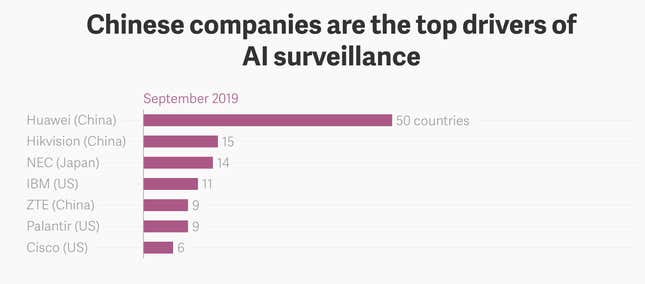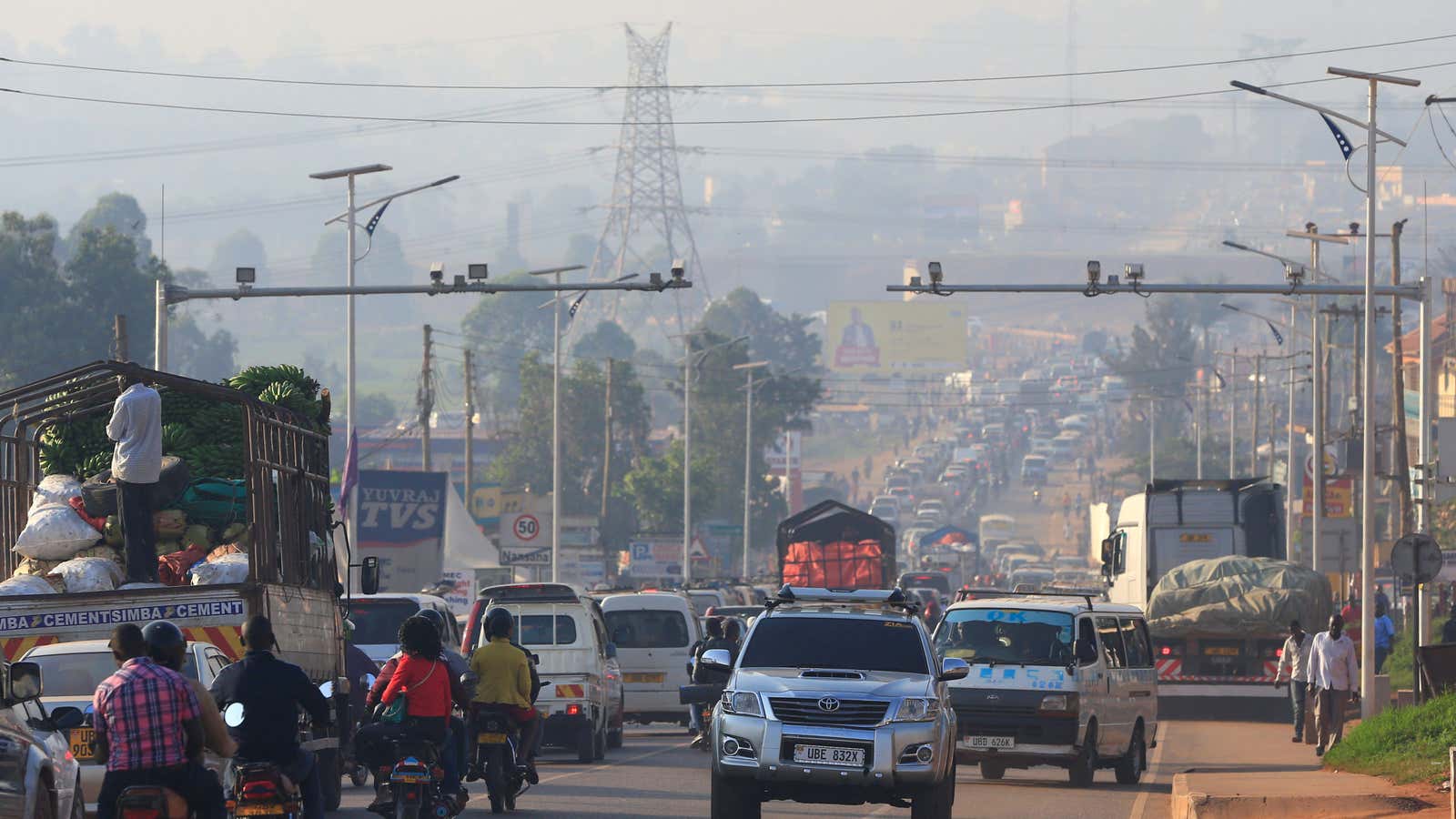In Europe and the US, tense debates have broken out over the national security ramifications of allowing Huawei to be involved in the construction of new 5G networks.
The UK has approved a limited role for the Shenzhen, China-based company in its upcoming wireless infrastructure despite sustained pressure from the US to exclude them. Part of the challenge is that despite racking up $121 billion in revenue around the world last year, Huawei is seen in some US political quarters as an extension of the Chinese government which can be used to spy on rival nations.
In a recent letter sent to the UK’s House of Commons, a group of US Senators urged the UK to reverse its decision, citing the “significant security, privacy and economic threats posed by Huawei.”
Across Africa, however, Huawei faces controversy of a different nature.
The Chinese telecoms equipment giant, which reportedly built up to 70% of the continent’s 4G infrastructure, stands accused of selling technologies to potentially repressive governments as part of its “Safe City” initiative and in so doing helping to undermine human rights in these countries.
Safe City initiatives are the Huawei’s flagship public safety solution designed to provide local authorities with a wide range of modern products and rely on a series of Internet of Things (IoT) devices intended to improve policing efforts.
The initiatives have expanded rapidly and are now active in over 700 cities and regions, including many in China.
A recent report by the Australian Strategic Policy Institute claimed the company has also been active in Xinjiang, where a complex web of surveillance technologies has been deployed to assist the forced detention of an estimated 1.5 million Uyghurs and other Muslim minority groups.
The company has repeatedly denied involvement in the region.
In its latest ‘Safe City’ brochure, the company promotes its “automated, intelligent policing information systems” and boasts of its “omnipresent sensing” and “intelligent surveillance” capabilities.
There are currently 12 ‘Safe City’ programs in sub-Saharan Africa, including in Uganda, Kenya and South Africa, according to the Center for Strategic and International Studies (CSIS), a think tank based in Washington DC.
Eight of the 12 initiatives in Africa are in countries deemed “partly free” and “not free” by Freedom House and globally, just 29% of all ‘Safe City’ initiatives are in countries regarded as “free,” according to CSIS.
Of course, Huawei’s willingness to trade with authoritarian regimes is certainly not unique among major telecoms and tech suppliers.
However, given the company’s dominance in the African telecommunications sector, concerns remain that its sophisticated tools, which include facial recognition cameras and social media monitoring tools, will be used by authoritarian-leaning regimes to undermine human rights.
“Huawei’s Safe City initiative undoubtedly threatens human rights in Uganda, including the right to peaceful assembly and association as the country prepares for [the] 2021 general elections,” said Dorothy Mukasa, CEO of Unwanted Witness, a Ugandan digital rights advocacy organization.
In August 2019, the Ugandan police force announced it had purchased facial recognition cameras from the company at a cost of $126 million as part of a ‘Safe City’ agreement.
“This is an extension of China’s surveillance apparatus into Uganda through [the] Ugandan Police force, an agency with a track record of brutalizing journalists and opposition politicians,” Mukasa added.
The Ethiopian government, where an internet shutdown in the Oromia region is nearing its fourth month, also has a ‘Safe City’ agreement with the company. The country has a long history of using sophisticated technologies acquired from private companies based in both China and the West as means of stifling dissent.
Last year, however, Huawei faced allegations few other companies have. A Wall Street Journal investigation alleged that the company had been helping the Ugandan and Zambian regimes track opposition politicians, including the popular musician and MP Bobi Wine.
The company vehemently denied the accusations, as have the Ugandan and Zambian authorities.
When asked if company implemented any safeguards to ensure the technology would not violate human rights, Adam Lane, the senior director of Public Affairs for Huawei’s Southern Africa division, said: “Huawei develops technology not public policy. That is the role of policy makers and legislators.”
“Huawei does not manage, use or have access to any of our systems—we only sell them to the customer and train them how to use it. It is up to individual countries to set their own policies, regulations and laws to govern how such systems are used, and for their legal systems to ensure implementation,” Lane added.
Many of the technologies sold as part of Huawei’s ‘Safe City’ initiatives are now also commonplace in democratic countries. Live facial recognition cameras, for example, were recently deployed in in London. The decision garnered staunch criticism from civil liberties organizations in the United Kingdom.
“Around the world in developed countries as well as developing countries, facial recognition cameras are being trialed to help identify, locate and catch criminals which can both improve crime conviction rates and thus also improve deterrence,” Lane said.
However, concerns over how such technology may be deployed in the African context have been exacerbated by a lack of regulatory safeguards and privacy legislation across the continent. “In Africa, many countries are still grappling with the fundamentals of privacy and data protection,” says Juliet Nanfuka of the digital rights advocacy organization, the Collaboration on International ICT Policy for East and Southern Africa (CIPESA).
This has led to “many gaps which question the extent to which national security or state surveillance programs of individuals are proportionate, fair, and in compliance with international norms and standards,” Nanfuka continued.
Huawei is the leading provider of surveillance tools to African governments in around 15 countries, but it is not the only one. In many African countries, which are dealing with the convergence of a youth bulge, high unemployment and aging leaders, some of who have been in place as long as large portions of their population, the risk of conflict and agitation encourages the need for these tools.

Huawei has defended its use of surveillance measures and stressed the impact of its initiatives on local crime rates.
“Huawei’s safe city solution has multiple benefits, some of which are not well known to the public, and often the impact is not publicized by the police forces for security reasons,” Lane said.
In Nairobi, the company has claimed its ‘Safe City’ initiative led to a 46% drop in the regional crime rate in 2015.
Jonathan Hillman, director of the Reconnecting Asia Project at CSIS, is more skeptical about the impact of the initiatives. “With all the tracking and real-time data that Huawei’s ‘Safe Cities’ claim to provide, it is striking that very little information about the performance of these systems is available,” he said.
In the CSIS report, Hillman and Maesea McCalpin said the impact of the solutions on policing efforts “are difficult to verify and appear grossly exaggerated in some cases.”
Debates surrounding the need to balance public safety considerations with human rights protections are unlikely to subside in the coming months and, as increasingly sophisticated technologies are introduced across the continent, Huawei is likely to come under increased public scrutiny.
To ensure that human rights are protected, Nanfuka said that more effective policy, legal and regulatory frameworks were needed.
Without this, “the apprehension around facial recognition surveillance, despite being termed as “smart cities” or “safe cities” will remain, particularly in states which have a poor human rights track record,” Nanfuka said.
Sign up to the Quartz Africa Weekly Brief here for news and analysis on African business, tech and innovation in your inbox
